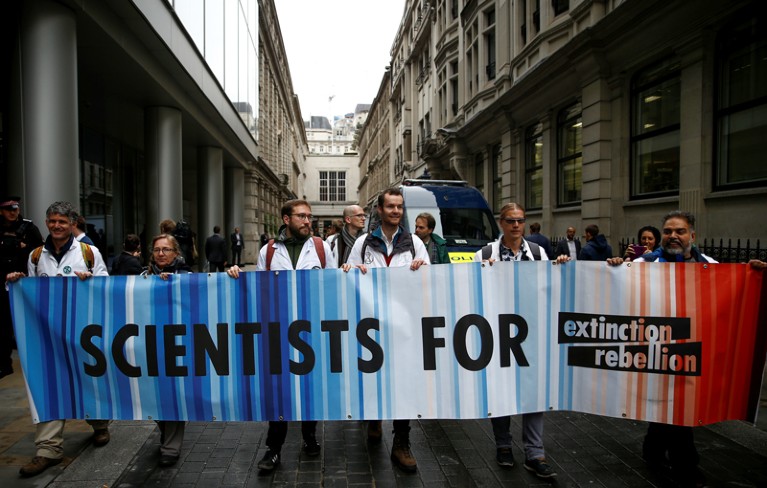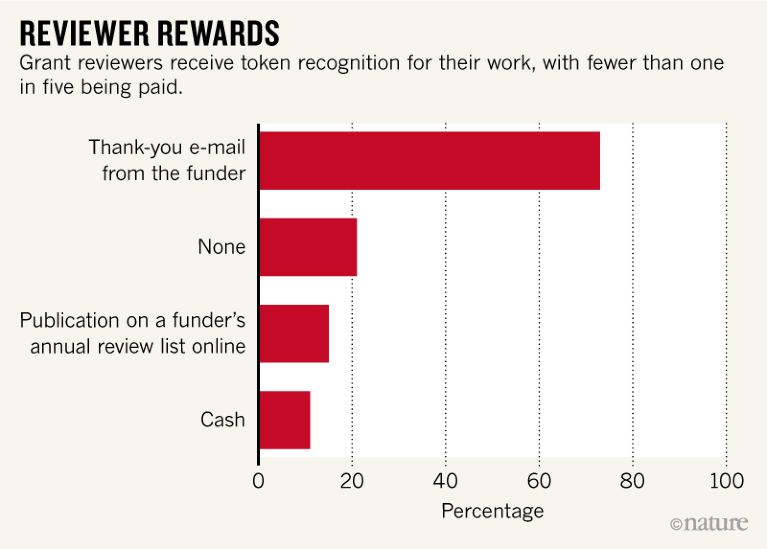RESEARCH
Atmospheric-explorer mission lifts off NASA launched a mission on 10 October to probe connections between weather on Earth and in space. The Ionospheric Connection Explorer (ICON) lifted off from Cape Canaveral Air Force Station, Florida, on a Pegasus XL rocket carried by an aeroplane; on separating from the plane, the rocket ignites its engines to reach orbit. ICON’s launch had been delayed for more than a year by problems with the rocket. The satellite will study the links between the electrically neutral lower part of Earth’s atmosphere and the electrically charged upper part, the ionosphere. Its four instruments will probe the region from about 90 kilometres to 580 kilometres above Earth’s surface, measuring the ionosphere’s density, structure and composition. Changes in the ionosphere can disrupt communications grids on Earth.

The Pegasus XL rocket containing ICON was carried by an aeroplane.Credit: Ben Smegelsky/NASA
CLIMATE CHANGE
Climate lawsuit Alaska’s Supreme Court heard arguments on 9 October in a climate lawsuit that accuses the state government of violating the rights of young people by encouraging the use of fossil fuels. Sixteen children and young adults, ranging in age from 7 to 22, filed the case. They argue that the state of Alaska has a constitutional responsibility to protect the climate as a public resource for future generations. Their goal is to overturn a state law enacted in 2010 to promote fossil-fuel development. The supreme court will now determine whether the lawsuit, known as Sinnok v. Alaska, can go to trial. The case is one of several legal challenges filed by young environmentalists — and their lawyers — around the world. It is patterned after a similar lawsuit filed in 2011, which the Alaska Supreme Court dismissed in 2014 because it did not challenge specific actions by the government.
POLICY
Misconduct law China’s science ministry released a draft on 8 October of its first law regulating research misconduct. The proposed law would make it illegal to: fail to declare a conflict of interest; embezzle research funds; breach intellectual-property rights; fabricate research results; commit plagiarism; and carry out research that “endangers national security”. The law follows a series of government policies designed to crack down on problems that have plagued China’s scientific community, such as data fabrication and faked authorship of research papers. Those caught committing misconduct could face penalties that include termination of research projects; loss of bonuses, awards and honorary titles; and being banned from applying for future government projects. Research managers can also be punished for covering up misconduct at their institution. The public can comment on the draft law until 8 November.
Funding plans The United Kingdom is set to get a new funding agency, broadly modelled on the US Defense Advanced Research Projects Agency, the British government announced on 14 October. The agency will bring a “new approach to funding emerging fields of research and technology”, the government said in a document setting out its priorities at the formal opening of a new parliamentary session. Details on the value of the proposed fund have not yet emerged. Dominic Cummings, senior adviser to Prime Minister Boris Johnson, pitched the idea for such an agency on his blog, before taking up his current role. The government added that it would soon release spending plans that include a boost for research funding, and that it would act to reduce bureaucracy in research.
EVENTS
Power blackout California’s largest utility company shut off power to more than one million people across the northern part of the state on 9 and 10 October. The outage sent scientists at the University of California, Berkeley, scrambling to save specimens and experiments. James Olzmann, a metabolic researcher at the university, moved his lab’s freezers on 9 October to facilities at the University of California, San Francisco, which still had power. And Jessica Lyons, a molecular biologist at Berkeley, stocked freezers in her lab with dry ice on 8 October after being warned of the impending outages. The Pacific Gas and Electric Company, based in San Francisco, planned the outages to reduce the risk of wildfires, citing forecasts of strong, dry winds that have fanned devastating blazes across the region in recent years. The company has acknowledged that its equipment probably sparked California’s deadliest known wildfire, which killed 86 people in 2018. It had restored power to most of its customers by 12 October.
Climate protests Hundreds of scientists worldwide are backing a campaign of civil disobedience in an attempt to force governments to act on climate change. “Continued governmental inaction over the climate and ecological crisis now justifies peaceful and non-violent protest and direct action, even if this goes beyond the bounds of the current law,” reads a statement, which has been signed by more than 800 academics. Scientists have an obligation to protect the natural world, it says. About 20 scientists gathered in London on 12 October to read out the call to action (pictured). It comes as protesters from the campaign group Extinction Rebellion disrupt cities around the world. Police have arrested more than 1,400 people in connection with the protests in London alone.

Scientists gathered in London on 12 October as part of demonstrations organized by the campaign group Extinction Rebellion.Credit: Henry Nicholls/Reuters
AWARDS
Nobel prizes Three scientists whose research led to the development of lithium-ion batteries — which revolutionized energy storage — won the 2019 Nobel Prize in Chemistry on 9 October. The prize honoured the work, done in the 1970s and 1980s, of John Goodenough, Stanley Whittingham and Akira Yoshino. On 14 October, the Nobel prize in economic sciences was awarded to three economists who used randomized controlled trials to determine how to lift people out of poverty. The winners are Michael Kremer at Harvard University in Cambridge, Massachusetts, and Abhijit Banerjee and Esther Duflo, both at the Massachusetts Institute of Technology, also in Cambridge. Duflo is only the second woman to win the economics Nobel.
PEOPLE
Alexei Leonov dies Soviet cosmonaut Alexei Leonov, the first person to walk in space, died on 11 October at the age of 85. In 1965, Leonov was orbiting Earth in the Voskhod 2 spacecraft when he opened the hatch and exited the capsule for more than 12 minutes. His spacesuit puffed up and he had to vent some air before he could re-enter the spacecraft — an untested move hailed as a gutsy decision. Leonov later worked with US counterparts to help smooth the way for joint US–Soviet ventures in spaceflight during the cold war. He was also an accomplished artist, who created the first sketches of Earth from space.
PUBLISHING
Open research More than two-thirds of research papers read online will be open-access articles by 2025, according to a large-scale analysis of publishing and readership trends. The study, released on 9 October, used data from more than 50,000 journals and open-access repositories (H. Piwowar et al. Preprint at bioRxiv http://doi.org/dcm7; 2019). Of 70 million papers published between 1950 and 2019, fewer than one-third are currently freely available, it found. But more than half of papers presently viewed online are open-access articles. The study predicted, by extrapolating data from recent trends, that by 2025, articles published open access in one form or another will account for 70% of all papers viewed online, and that 44% of all papers published since 1950 will be free to read.
TREND WATCH
More than half of researchers are more likely to accept requests to review grant applications if funders recognize their efforts, according to a survey of 4,700 researchers worldwide — the largest study of grant peer review so far. The Grant Review In Focus report, released on 10 October, was produced by Publons, a website that helps researchers to keep track of their peer-review contributions. It found that recognition is an important incentive for reviewers, who spend around ten days every year reviewing other academics’ funding proposals. The process helps funders to make decisions, and although many researchers get acknowledgements such as thank-you e-mails, around 20% say they do not receive any recognition. Only a handful have received payment. However, the report suggests that greater financial rewards wouldn’t necessarily sway reviewers into accepting more requests: cash came just sixth on the list of potential incentives. Instead, researchers prefer to have more recognition from employers and funders, to know the outcomes of the proposals they reviewed and to get feedback on the quality of their evaluation, the survey found.

Source: Grant Review In Focus



